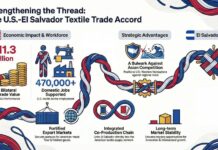Zara’s parent company, Inditex, reported on Wednesday that its quarterly sales were weaker than anticipated, indicating a slower start to the summer season compared to last year amid ongoing economic uncertainty.
The Spanish retailer generated revenues of 8.27 billion euros ($9.44 billion) for the fiscal first quarter, covering the period from February 1 to April 30, slightly below the 8.39 billion euros forecast by LSEG analysts.
Net income for the quarter reached 1.3 billion euros, falling short of the 1.32 billion euros estimated by analysts.
As a result, the company’s shares closed down by 4.4%.
Inditex also noted a slower beginning to summer sales, which rose by 6% at constant currencies from May 1 to June 9, compared to a 12% increase during the same period last year on a constant currency basis.
The company, which owns several well-known high street brands such as Pull & Bear, Bershka, and Massimo Dutti, is often viewed as an indicator of broader consumer sentiment and spending behaviors. With the U.S. as its second-largest market after Spain, Inditex mentioned that the effect of tariffs on consumer spending is currently uncertain.
“The current environment is difficult to predict and we’re continuing to monitor the situation,” stated Gorka García-Tapia Yturriaga, Inditex’s head of investor relations, during an earnings call.
He emphasized that the firm’s diversified and flexible supply chains would help mitigate the impact of these challenges. Inditex currently manufactures a majority of its products in various regions across Asia, as well as in Spain, Portugal, Morocco, Turkey, Brazil, and Argentina.
“We see growth opportunities globally, not just in one market,” he added.
Mamta Valechha, a consumer discretionary analyst at Quilter Cheviot, remarked that Wednesday’s results are likely to “fuel further debate” regarding the company’s growth trajectory amidst wider economic pressures.
“Bears [will be] pointing to a normalization in Inditex’s growth and questioning whether its valuation can be justified, while bulls will highlight its strong track record and resilience in a tough retail environment,” she noted.
In March, Inditex indicated a slowdown in demand at the beginning of the year, which CEO Óscar García Maceiras attributed to tariff-related uncertainties.
Following these comments, shares dropped significantly, and as of Monday, the stock remains approximately 12% lower than its peak on December 4.
These remarks came as Inditex reported a year-on-year sales increase in the fourth quarter, reaching 11.21 billion euros, which met expectations. This followed a rare miss in sales and profits in the third quarter, attributed to flooding in Spain that affected consumer spending.
Inditex has established a clear advantage over high street competitor H&M, which revealed weaker-than-expected fiscal first-quarter revenues in March, as sales continue to decline for the Swedish fashion brand.
Both retail giants, however, face intensified competition from lower-cost fast fashion brands like the Chinese-founded Shein and Temu. Nonetheless, rising U.S. tariffs on Chinese goods and the closure of the ‘de minimis’ trade loophole are expected to create significant challenges for these disruptive companies.

































